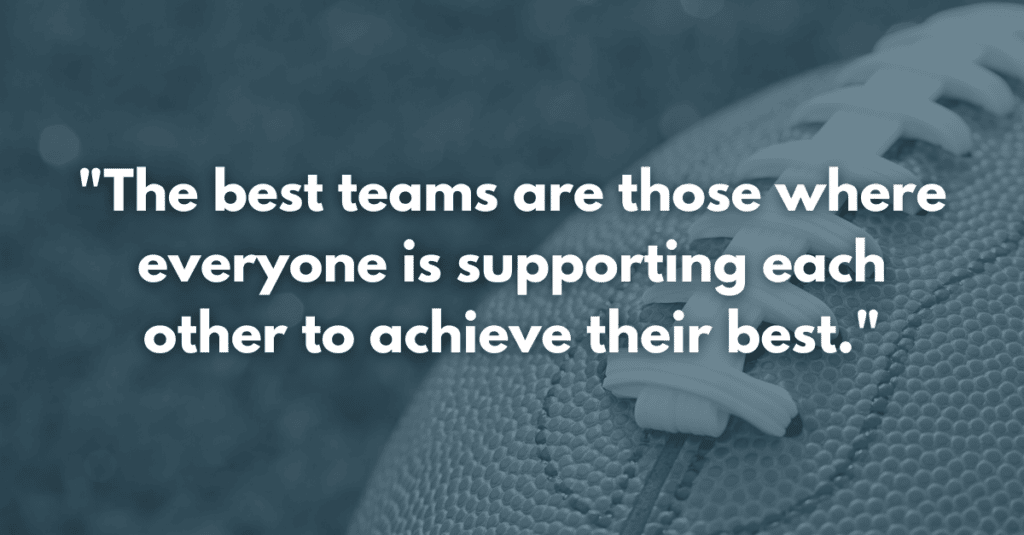Three Key Elements of Coaching in Business
I've been thinking a lot lately about what makes a good coach, and how the elements of coaching in sports can be applied to coaching in business.
This week was very exciting for me – my daughter’s small-town volleyball team made the state tournament for the first time in 39 years. Over the years, our family has spent a lot of time talking and thinking about coaching and the impact that has on teams. As we talk about what works and doesn’t work in the coaching ranks, we keep coming back to three common elements that great coaches have and I think these elements parallel what makes a great manager in business as well.
In my town of 2,600 people, we have a very successful high school football team. We’ve now made it to state 7 years in a row and this year might be the best team of them all, even though going into the year it may not have been our best team "on paper." We are not winning because we have more talent than the other towns. We win because the program is built to make the team successful. Everything from youth football to the offseason program, to the practices and the film sessions, need to come together to make this great team.
Let’s look at how these elements work in sports and how that same capability makes for a great people manager in the business.
1 - Creating a Winning Environment
Winning begets winning – the more you win, the easier it is to win in the future. The more you lose, the harder it is to imagine yourself winning. It’s easier to keep winning once you start, but how do you get over the hump and turn a losing program into a winning program.
Instill Positive Thought
First, although it sounds simple, you have to believe you can win and you have to build that belief in your team that it’s possible. You have to explain how each step you are taking is moving you in the right direction to a winning program. If you don’t convince a football player it’s important to lift weights, you probably won’t have a winning team in the end. Every step forward is a step towards a winning program and if the team understands that, they can start to see themselves winning.
Communicate Openly
Communication is so key to winning programs as well – having difficult conversations with the players about their role and why it’s important is something many coaches don’t do but it’s a critical part of building a winning program. Even if your role is 3rd string safety, you need to tell that kid why it’s important for them to work hard in practice to make the first-string team ready for the game.
In business, winning isn’t as apparent as it is when you look at a scoreboard at the end of the day. A great manager sets challenging, yet attainable goals so they can create an environment where their team (when properly motivated) can exceed those goals and celebrate the win. Just like in football, you need to clearly communicate the roles each team member plays on the team to make sure they can exceed their target.
Take Care of Mental Health
Psychologic safety is key to a successful team – you create psychological safety when everyone on the team feels empowered to share their ideas and challenge each other in a positive, respectful way. The best teams are those where everyone is supporting each other to achieve their best.
Be Motivational
As a manager (or coach), your goal is to motivate your team to be as successful as possible. Team members are motivated by the mission of the company, the people they work with and the recognition they receive for a job well done. Find the right way to light that fire inside of them that makes them want to spend the extra time in the weight room or working on the proposal and you’ll see a real improvement that you can continue to build on.
2 - Building Your Team’s Skills
Humans are not “finished products” – no matter how much you know, you can always get better. You can always grow your skills and take your strengths to another level.
Practice and Improve
In football, one of the most straightforward ways to get better is to lift weights. If you have a good weight-lifting plan, you can continue to get stronger and that will make you better at any position on the field. Repetition (reps) is a way you can get better in any sport – the more reps you take the more your muscles will start to remember exactly what to do in that situation. I’m amazed at how my daughter continues to make tough serves under the bright lights of the state tournament, but she does it because she’s served so many times in her life her muscle memory is tuned so she doesn’t have to think about it – she does it.
In business, I find it fascinating whenever someone says a person on their team is really good at what they do and they just need to keep doing it. There are so many new skills you can learn in business – especially in a technology-oriented business like ours – you can never rest on your laurels. The software we use day-to-day is always changing and beyond technology, you can always learn how to be a better presenter, a better listener, and a better manager.
Set a Good Example
As a leader, you have an opportunity (and frankly an expectation) to take the time to work with your team member to find those new skills they can develop. You have to bring some creativity to this conversation and you have to be willing to challenge your team member so that they can get better. Open their eyes to new technology or new techniques that can help them learn more. You have to remember though, just sending them to training doesn’t make them better – you have to challenge them to apply that training so they can show true improvement in that area.
3 - Deploying Your Team Optimally
Whenever I watch a football game, invariably the “armchair quarterbacks” have suggestions about what play should have been run or what the safety should’ve done on that play. You don’t have to look far for opinions on strategy when it comes to football. A coach’s job is much harder than that, as they have to:
- First, you put the right people on the field and then get them running the right play at the right time - This requires an in-depth assessment of your team’s skills so you know who is your best receiver or defensive tackle and what scenarios are best suited for those skill sets
- Second, you have to watch the film to understand what your opponent might do and potentially change their personnel to match up with your opponents’ skill sets
- Third, you have to practice what you’ll do over and over again so the team develops the muscle memory
- Last, you have to perform what you practiced on game day
If you’re just casually watching a game, this is the easiest of the three elements to see – you can tell the teams who have a good plan and execute that plan well during a game. The first two elements are critical to executing the third one, but you can’t necessarily tell how many hours someone was in the weight room while you’re watching a game.
How Stoneridge Helps You Win with Coaching in Business
As a manager, you need to understand deeply the capability of your team members as well as what motivates them. If you put your team in a position where they don’t have the skills to succeed, that will de-motivate them and have them questioning if this is where they want to be. We constantly talk about how we need to put our team in a position to be successful – if we don’t, we shouldn’t expect results.
The comparison between coaching in sports and coaching in business can be broken down like this:
- Creating a Winning Environment - This can be applied to both. Just like you wouldn't force your star offensive tackle to play safety, you wouldn't want to force an employee into a role detrimental to their development and to the team's objectives. Putting everybody in a position to succeed will yield better results on the field and in the office
- Building Team Skill Sets - Just like a coach can motivate and set the example for their players to hit the weight room, study film, and practice to perform to the best of their ability, a manager can encourage employees by providing them with training, giving them opportunities to practice their skills, provide plenty of mentorship, and practice and improve themselves
- Deploying Your Team Optimally - This ties in with both sports and business in a few ways:
- Putting the right people in the right spots on the field is assigning the right people with the right skill sets to a work project
- Players watching film is employees studying the techniques, technologies, and solutions your team uses to work efficiently
- Practicing on the field is practicing in test environments - The more your employee's practice, the easier the work will become
- Performing on game day is performing on the day of an implementation (or other business tasks) - If your employees have practiced and grown in a safe and motivational environment, they're more likely to perform well
This doesn’t mean you only give easy opportunities to your team; they will never grow if they do the easiest possible work all the time. You have to push them and help them through those challenging assignments. Spend time giving them advice on how to make the sales pitch or what a certain audience member wants to hear so their presence can be successful. Walking through your thought process will be a great opportunity for them to learn.
Stoneridge Software deploys these philosophies on a daily basis with both our employees and clients. We are thrilled to help you win through coaching. We not only provide you with the hardware, software, and solutions your business needs to thrive, but we will also be there with you to guide you every step of the way with ongoing support.
I look back at my time coaching my daughters’ basketball teams when they were younger and wish I had focused more on these 3 key elements. Coaches can make a major difference in people’s lives when they bring out the best in them – as a people manager, you have that same opportunity. What’s better than hearing from someone you used to manage about how you made a difference in their lives? There’s nothing more rewarding to hear than that!
Questions?
Please reach out to us! We want to help you optimize your solutions and your team.
Under the terms of this license, you are authorized to share and redistribute the content across various mediums, subject to adherence to the specified conditions: you must provide proper attribution to Stoneridge as the original creator in a manner that does not imply their endorsement of your use, the material is to be utilized solely for non-commercial purposes, and alterations, modifications, or derivative works based on the original material are strictly prohibited.
Responsibility rests with the licensee to ensure that their use of the material does not violate any other rights.






